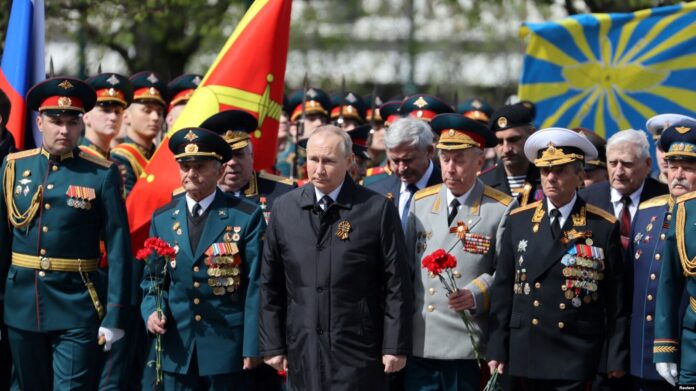Written by: Seringe ST Touray; Reporting from Beijing, China.
Today, the Russian capital prepares for the country’s 80th Victory Day anniversary. Chinese President Xi Jinping leads the delegation of about thirty international leaders attending what is shaping up to be a significant military parade, traditionally held in Red Square – a landmark in central Moscow. Burkina Faso’s President, Captain Ibrahim Traoré, is also in attendance, which in particular highlights the deepening diplomatic engagement between Russia and Africa.
“There’s definitely a feeling of celebration in the air here in Moscow,” reports BBC producer Ben Tavern from the Russian capital on Thursday. “I think it’s fair to say that every single shop window in Moscow is plastered with something to do with the 80th anniversary of Victory Day.”
The Russian word ‘победа,’ which translates to ‘Victory,’ is prominently displayed across all of Russia’s major cities, appearing on public services like street sweepers, dust arts, metro carriages, and park benches. Also displayed throughout the city are historic photographs from 1945 Berlin, including the famous photo of Soviet soldiers raising the flag over the Moscow capital.
President Traoré, known across Africa for his political stance and leadership style, is joined by other African heads of state, including Zimbabwe’s Emmerson Mnangagwa and Egypt’s Abdel Fattah el-Sisi. Their attendance is being interpreted by some analysts as part of a “broad coalition backing Moscow in defiance of the West.”
Russia’s growing diplomatic efforts in the Global South, which observers see as part of the country’s broader strategy to build new international partnerships, are on display through the presence of delegations from countries including Guinea-Bissau, Equatorial Guinea, as well as Ethiopia.
The parade also carries a political dimension. Reports suggest this year’s event is intended to send a clear message to Washington that Russia will not accept a Ukraine peace deal dictated by the US. With nearly thirty heads of state in attendance and a major military display underway, the event is being framed as a demonstration of Russia’s current international alignments.
The guest list appears carefully chosen to demonstrate that Russia can still keep strong ties with other countries, even under sanctions and international pressure. Some of the leaders attending include Cuban President Miguel Díaz-Canel, Brazilian President Luiz Inácio Lula da Silva, Belarusian President Alexander Lukashenko, and Chinese President Xi Jinping.
More than 10,000 soldiers are taking part in the event, along with 125 pieces of military equipment. These include historic T-34 tanks and modern missile systems. Troops from 13 countries are also joining, including Azerbaijan, Belarus, China, Egypt, Laos, Kazakhstan, Kyrgyzstan, Mongolia, Myanmar, Tajikistan, Turkmenistan, Uzbekistan, and Vietnam.
Some political commentators are already calling today’s parade a bold show of Russia’s strength on the world stage. They say it sends a clear message against Western attempts to isolate the country.
Meanwhile, Ukrainian President Volodymyr Zelensky has made a strong statement that many see as a warning. He says Ukraine “cannot guarantee the safety of attending leaders.” In response, Russia has increased its air defenses while also putting a no-fly zone in place.
Slovak Prime Minister Robert Fico has responded to Zelensky’s comments, saying: “This is unprecedented, that’s just too ridiculous for me… Don’t go there, watch out, because we will do something to you. This is not done. I reject such threats.” Fico confirmed his participation, adding: “They still haven’t convinced me not to go. It’s hard to get through to hard-headed people.”
The attendance of EU member Slovakia’s Fico and Serbia’s President Aleksandar Vučić is seen by some as an indication of divisions within NATO and the European Union. Their participation, despite criticism from Brussels, is being interpreted by analysts as reflecting “growing skepticism of US-led foreign policy across parts of Europe.” Serbia’s involvement, for instance, may complicate its EU candidacy, while Fico’s presence is being viewed as indicative of what some describe as “a broader regional trend – a pivot toward national sovereignty and away from Western alignment.”
Over the years, there has been a notable and steady increase in the number of world leaders attending the grand Victory Day event, in spite of the ongoing Ukraine conflict and its many global implications, including security concerns. According to BBC, no foreign leader participated in 2022, a number which rose to seven world leaders in 2023, and about thirty this year.
Leaders from Central Asia—Kazakhstan, Kyrgyzstan, Tajikistan, Turkmenistan, and Uzbekistan—are confirmed to be attending, along with those from Laos, Vietnam, and Mongolia. Analysts say this reflects Russia’s continuing diplomatic outreach to the Global South and Asia.
Victory Day commemorates the Soviet Union’s defeat of Nazi Germany in 1945, a milestone that claimed the lives of an estimated 27 million Soviet citizens. The event, originally focused on remembrance, is increasingly being framed by commentators as a statement of “Russia’s place as a great power.”
While North Korea is represented by its ambassador and speculation over US participation has been refuted, the scale of attendance is being characterized by some observers as “more than a commemoration” — suggesting a broader geopolitical messaging effort.
As final preparations end and security tightens following Ukraine’s warning, the 80th Victory Day is shaping up to be what some call “a calculated act of global defiance.” The presence of key figures such as Captain Traoré and President Xi is viewed by some analysts as a sign of Russia’s partial re-engagement on the global stage after a period of isolation. Ultimately, what is unfolding in Red Square this morning is expected to have implications for how Russia’s role in international affairs is perceived moving forward.




